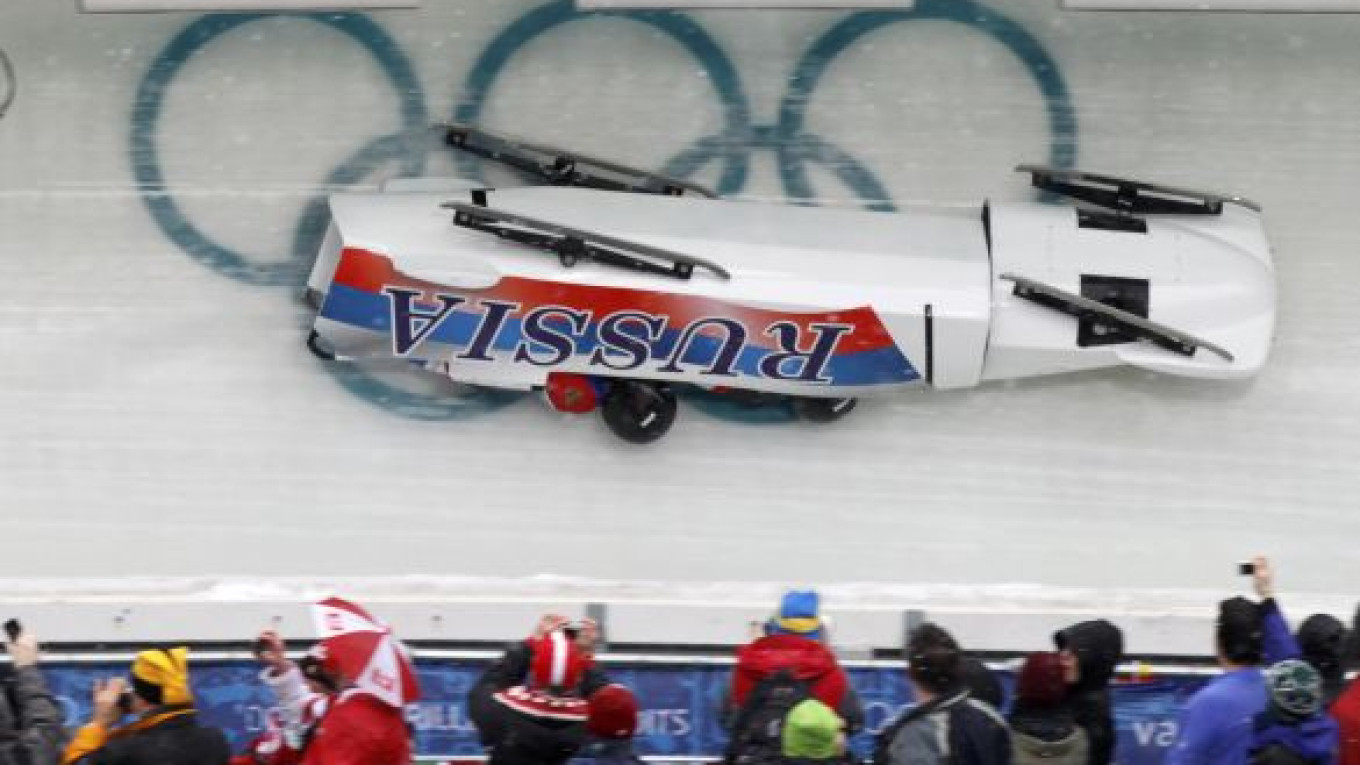Perhaps it's surprising that Russia managed to walk away with even three gold medals after giving its worst-ever performance at a Winter Olympics.
Its luge team, for one, has to build its own sleds for lack of money and only got a track to practice on at home in 2008 — and even then it doesn't freeze properly.
“We make the equipment ourselves and almost from scratch,” Valery Silakov, president of the Russian luge federation, told The Moscow Times.
Silakov explained that it is hard to find people to produce luges within the country and even the Khrunichev space center cannot guarantee that its luges, which cost more than $100,000 each, will reach the needed speeds of about 130 kilometers per hour.
The Russian luge team left the Vancouver Games medal-less after veteran Albert Demchenko, 38, placed fourth. Demchenko complained in Vancouver about the lack of financing for his sport, saying he has to repair his luge out of his own pocket.
He and his fellow athletes only got a chance to train in Russia when a luge and bobsleigh stadium opened in Paramonovo, outside Moscow, in March 2008. The stadium, however, routinely faces problems with its freezing equipment, Silakov said. The stadium originally built for Soviet athletes is located in now-independent Latvia.
Despite the difficulties, Demchenk said he would like to try his luck at the Sochi Games in 2014, when he will be 42.
Russia might need him. With many athletes deserting during the turbulent 1990s, the younger generation who has replaced them remains amateurish. “Many of them entered sports schools after the [training] system had already been destroyed,” Silakov said.
With only two events left Sunday, Russia looked set to place a dismal 11th in the gold medals table, well behind leader Canada (13) and even countries like South Korea (6) and China (5). Russia also won five silvers and seven bronzes for a total of 15 medals.
Among the biggest setbacks were in ice hockey and skating, which the Soviet Union and Russia had dominated since the 1960s. An embarrassed President Dmitry Medvedev canceled a scheduled trip to Sunday's closing ceremony.
Russia previously gave its poorest performance in the 2002 Salt Lake City Games, collecting five golds for a total of 13 medals.
The luge team's woes are typical of the problems facing all athletes. While the government boosted financing for Winter Olympic teams to $25 million last year, up from $22 million in 2008, a lack of proper training facilities, rampant corruption and a small pool of eager athletes contributed to Russia's failure in Vancouver, sports officials and athletes said.
Prime Minister Vladimir Putin has said Russia needed to learn the lessons offered by Vancouver, but no shakeups are expected in the sporting world that could improve Russia's chances for the Sochi Games.
Russia's complete failure to win any golds in ice skating has prompted harsh criticism from champion Soviet ice skater Irina Rodnina.
She accused the heads of Russian sports federations of running their organizations like "family businesses" and lashed out at Russian Olympic Committee head Leonid Tyagachev, a close friend of Putin and his personal ski coach.
"Do you think that those who are responsible for the results are upset? I saw Tyagachev in the Russian House restaurant yesterday. He had a good appetite," Rodnina told the Sovietsky Sport newspaper.
Sports federations are independent, although most of their financial support comes from the state. The state allocations are disproportional, with the majority going to hockey, biathlon, ski racing and ice skating, while far less goes to short track, ski jumping and luge.
Of the three golds that Russia won, two were in biathlon and one was in ski racing.
Former ice skating champion and State Duma Deputy Anton Sikharulidze described the situation inside the federations and the Olympic committee as “wild,” in an interview with Ekho Moskvy radio.
Federation Council Speaker Sergei Mironov and other politicians have called on Tyagachev and Sports Minister Vitaly Mutko to resign, and 54 percent of Russians feel likewise, according to an Interfax poll last week.
Tyagachev and Mutko have been summoned to give a briefing to the Duma in early April, but neither has given any indication that they might quit.
Mutko said last week that Russia's problem in Vancouver was that it was "trying to use simple methods and trying to find people to blame," RIA-Novosti reported.
The Audit Chamber has promised to check to make sure that government funds earmarked for Olympic training were spent properly.
Roman Kostomarov, who won gold in ice dancing for Russia in the 2006 Winter Olympics in Turin, Italy, said Russia should have placed more emphasis on training than on calculating how many medals to get. The Sports Ministry published a plan in 2008 that foresaw Russia winning 11 golds.
“The Olympic Games are not something that can be blueprinted in advance," he told The Moscow Times. "This is like selling a bearskin before the bear is caught."
A Message from The Moscow Times:
Dear readers,
We are facing unprecedented challenges. Russia's Prosecutor General's Office has designated The Moscow Times as an "undesirable" organization, criminalizing our work and putting our staff at risk of prosecution. This follows our earlier unjust labeling as a "foreign agent."
These actions are direct attempts to silence independent journalism in Russia. The authorities claim our work "discredits the decisions of the Russian leadership." We see things differently: we strive to provide accurate, unbiased reporting on Russia.
We, the journalists of The Moscow Times, refuse to be silenced. But to continue our work, we need your help.
Your support, no matter how small, makes a world of difference. If you can, please support us monthly starting from just $2. It's quick to set up, and every contribution makes a significant impact.
By supporting The Moscow Times, you're defending open, independent journalism in the face of repression. Thank you for standing with us.
Remind me later.


